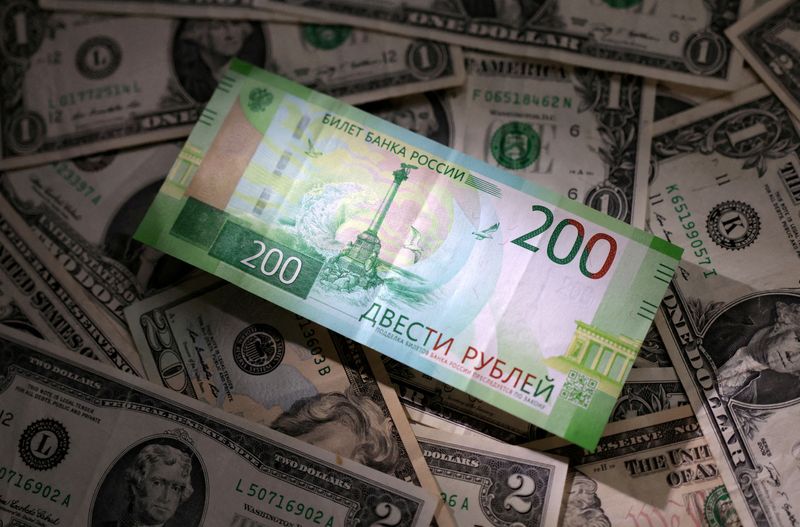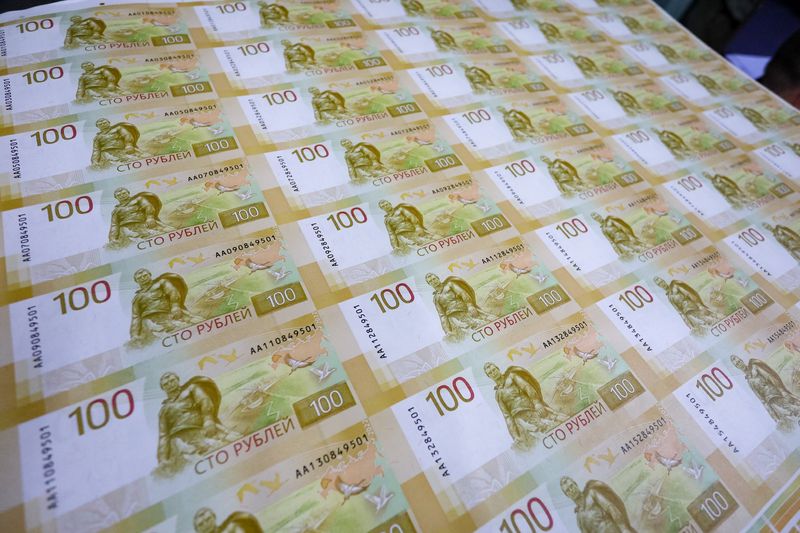MOSCOW (Reuters) -The tumbling rouble reversed course late on Monday, rising back to the strong side of 100 against the dollar after Russia's central bank sparked expectations of another hefty rate hike in announcing an extraordinary policy meeting for Tuesday.
President Vladimir Putin's economic adviser earlier rebuked the central bank as the rouble slid past 101, blaming its loose policy in a sign of growing discord among authorities.
The rouble had lost around a quarter of its value against the dollar since Putin sent troops into Ukraine in February 2022, as Western sanctions take their toll on Russia's balance of trade and military spending soars.
On the Moscow Exchange, the rouble sank as low as 101.75 on Monday, its weakest in almost 17 months and down 30% down so far this year.
By 1534 GMT it had pared all intraday losses and was up 1.8% on the day at 97.62.
Putin's economic adviser Maxim Oreshkin earlier said the central bank could ensure that the pace of lending drops to sustainable levels with higher rates.
High consumer lending, along with a stark labour shortage and wide budget deficit, have all fanned inflation this year.
"The main source of rouble weakening and accelerating inflation is soft monetary policy," Oreshkin wrote in an op-ed for the TASS news agency. "The central bank has all the tools to normalise the situation in the near future."
The Bank of Russia's next scheduled interest rate decision had been due on Sept. 15. Asked earlier whether it might make an emergency hike from the current 8.5%, the central bank declined to comment.
Another key rate hike is coming, said Promsvyazbank analyst Denis Popov, following on from the central bank's 100-basis-point increase on July 21.
"Roubles should become more expensive to limit demand, including for imports," Popov said. The bank may also seek to limit the rouble liquidity surplus and even tighten rules on cross-border capital flows, he said.
The central bank has blamed the rouble's slide on Russia's shrinking current account surplus - down 85% year-on-year in January-July. On Monday, the bank said it saw no financial stability risks from the rouble's weakening but that a rate hike was possible soon.
Higher interest rates would make life harder for borrowers, including companies and the government as it finances military operations in Ukraine.
"People in Russia have always had a portfolio in hard currency and portfolio in roubles," said Matt Vogel at FIM partners, adding that without efforts to support the currency there was more of an incentive to convert roubles into dollars or other currencies.
'LAUGHING AT US'
Central Bank Governor Elvira Nabiullina won plaudits for her handling of the economy in the immediate aftermath of Russia's invasion, but she may be being lined up as a scapegoat ahead of next March's presidential election, as the weak rouble and stubbornly high inflation hurt consumers.
Popular pro-Kremlin television presenter Vladimir Solovyev, whose Rossiya 1 shows are watched by millions of Russians, launched into an aggressive, expletive-ridden criticism of the central bank late last week.
"...every other country is laughing at us, at our rouble being one of the three weakest currencies, thanks to the 'genius' policy of the central bank," he said.
The population is feeling the pinch, too, according to Russians Reuters spoke to in Moscow on Monday.
"Of course, rising prices affect us, regular citizens, a lot," said Ivan, a Moscow resident. "Because our salaries aren't growing, and it takes a bite out of (what's in) our wallets."
'DAMNING INDICTMENT'
The rouble has had a turbulent course since Russia invaded Ukraine, slumping to a record low of 120 against the dollar in March last year before recovering to a more than seven-year high a few months later, supported by capital controls and surging export revenues.
In the year leading up to the war, the rouble traded at around 74 to the dollar on average, with its movement dictated by factors like prices for oil, Russia's major export, and susceptible to sharp geopolitics-induced swings.
"The weaker rouble is a damning indictment of Russia’s war on Ukraine," Timothy Ash, a London-based senior sovereign strategist at BlueBay Asset Management, said in an email.
"It is being driven not only by lower energy receipts due to the loss of the bulk of the European gas business but also by the success of the G7 oil price cap, the much higher cost of imports due to sanctions and then continued capital flight."
Last week, Russia effectively abandoned its budget rule, with the central bank halting the finance ministry's FX purchases to try to reduce volatility. Analysts widely agreed that those measures alone were too minimal in scope to significantly support the currency.
"The central bank is not fully in control," independent Moscow-based economist Ian Melkumov told Reuters.

He said the bank could hike rates drastically, as it did to 20% shortly after Russia began what it calls a "special military operation" in Ukraine. A move to even 15% would stop the rouble's decline, he said, but it would come at a price.
"The central bank doesn't want to kill the economy and businesses in the same way it had to last year," he said.
